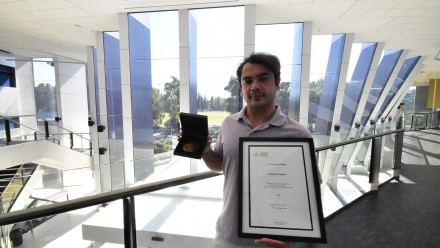Trafficking inside cells to initiate immunity
Dr Justine Mintern, Senior Lecturer & Head of Vaccine Biology Laboratory, Department of Biochemistry and Molecular Biology, Bio21 Molecular Science and Biotechnology Institute, The University of Melbourne
Dr Justine Mintern and her research team investigate how an immune response begins. Research encompasses understanding the fundamental biology of immunity through to advancing innovative vaccine design. Specifically, the Mintern laboratory analyse the biology of dendritic cells and how these cells use pathways of intracellular trafficking to generate cytotoxic and helper T cell immunity. This involves analysis of endocytosis, recycling, ubiquitin-mediated trafficking and autophagy and the trafficking machinery involved. The Mintern laboratory also exploits dendritic cell biology to advance vaccine technology by testing the potential of nanoparticles as vaccines in settings of immunity and infection.
Dr Justine Mintern heads the Vaccine Biology laboratory in the Department of Biochemistry and Molecular Biology at the University of Melbourne and the Bio21 Molecular Science and Biotechnology Institute. Justine’s research dissects the molecular pathways involved in promoting effective immunity. Her research uses cell biology, molecular biology and immunological approaches to uncover fundamental mechanisms of how an immune response is initiated. Major research projects include the investigation of dendritic cell biology, understanding immunity to infection and the design of effective vaccines. Justine completed her PhD at Walter and Eliza Hall Institute and undertook postdoctoral research at Harvard Medical School (Boston, USA) and the Whitehead Institute for Medical Research (Boston, USA) before returning to the University of Melbourne to head her own laboratory.












